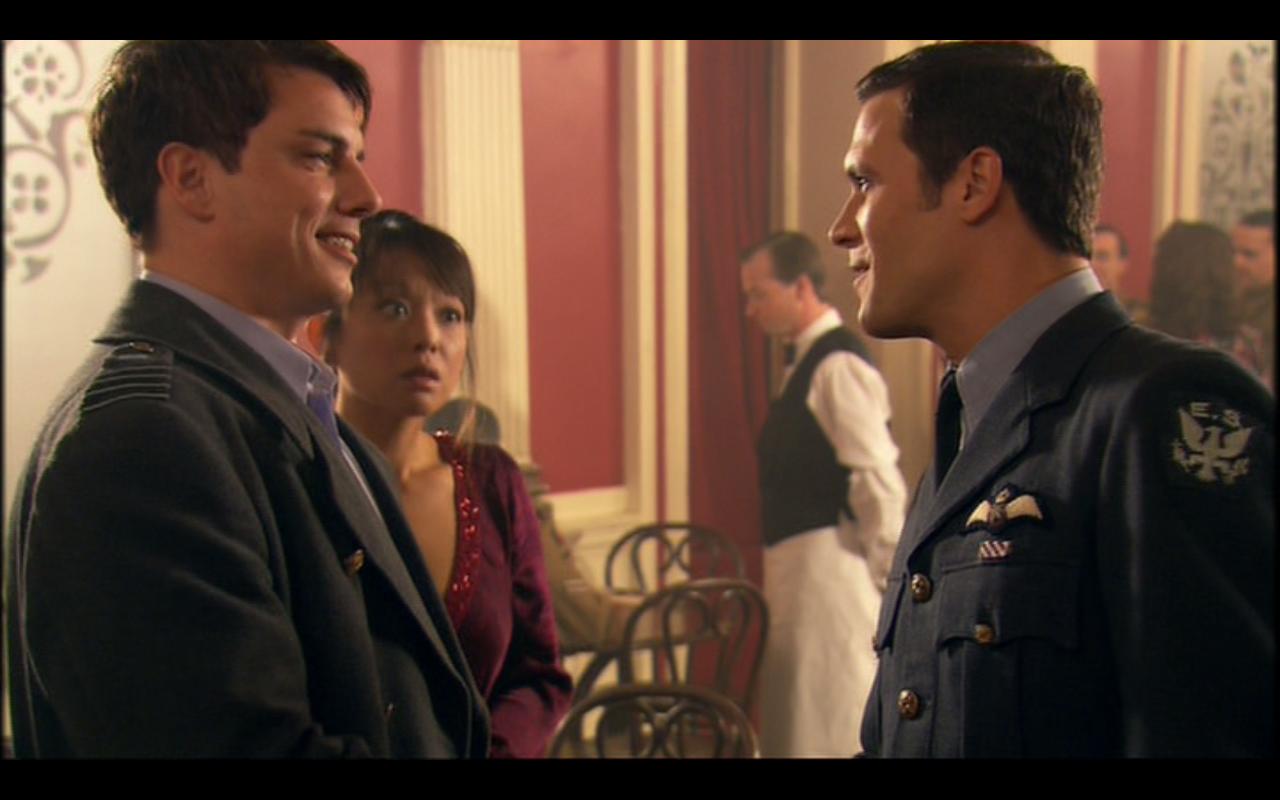 |
| Jack and Tosh meet the real Captain Jack Harkness. ("Captain Jack Harkness") ©BBC |
This is the first concern with this episode; there doesn't really seem to be a good dramatic motivation for this burgeoning romance. The fraternal aspect is fine, even laudable; Jack knows the real Captain's future, and he wants to ensure that he makes the right choices before he dies. It's just not clear why this would cause the Captain (as the credits call him) to suddenly want to start kissing Jack. If he thinks he's going to die (which might be the case, but if so it's very subtle), then fine, maybe, but it still seems both weird and superfluous -- the story doesn't gain anything from Jack sharing a kiss with his namesake.183 And what did the Captain's men think of this? (Or the Rift suddenly opening up, for that matter.)
The other storyline involves Toshiko's attempts to provide the present-day Torchwood team with the mathematical formulas they'll need to safely open the Rift and bring Tosh and Jack home. So while Tosh is trying to hide papers with numbers on them, Gwen and Owen are looking for ways to bring them back. Owen seems hell-bent on getting them both back, to the point that he doesn't question any of the increasingly strange coincidences going on. The 21st-century team realizes that the current caretaker of the building, Bilis Manger, is the same person as the one in 1941, which leads Owen to realize that Bilis can travel back and forth through the Rift. (Or maybe he's incredibly long lived, like Jack, but that doesn't seem to have occurred to him.) But does he interrogate Bilis, or grab and throw him into a holding cell? No, Owen looks through Bilis's office, finds the missing piece of the Rift Manipulator (without stopping to consider why on Earth Bilis would have this in the first place -- and in fact this point isn't touched on at all), and decides he's going to use it to open the Rift. There's loyalty and then there's blind loyalty, and Owen seems to be falling into the second category.
That stuff seems to be setting up the series 1 finale next episode, though; the primary focus of the episode is in 1941, in that relationship between Jack and the Captain. And up until the point where it starts to turn romantic, it works really well. There's an interesting exploration of what you do if you know someone's going to die but can't tell them, and there's also a nice discussion of what it means to be a leader, and does that mean you have to be brave in front of your squadron all the time? Are you allowed to be scared, and is it OK to be scared? It's a question deftly handled by the script.
Really, except for the strange resolution of the 1941 storyline and Owen's unquestioning use of specifically Rift equipment found in unlikely places (so, SOP for Torchwood members, then), "Captain Jack Harkness" does a good job of balancing its points of view in a way that doesn't make you hate everyone on screen. It even takes a bit of time to indulge in some racism against Tosh, just to demonstrate that we really are in 1941 (compare with reactions to Martha in, say, "The Shakespeare Code"). It's not a knockout success, but it is another in a line of decent stories that you can watch without too much difficulty.
183 We later find out in "Fragments" that our Jack has super-charged pheromones, and so the Captain's response to Jack might just be because of that. But obviously that explanation isn't anywhere to be found in this.